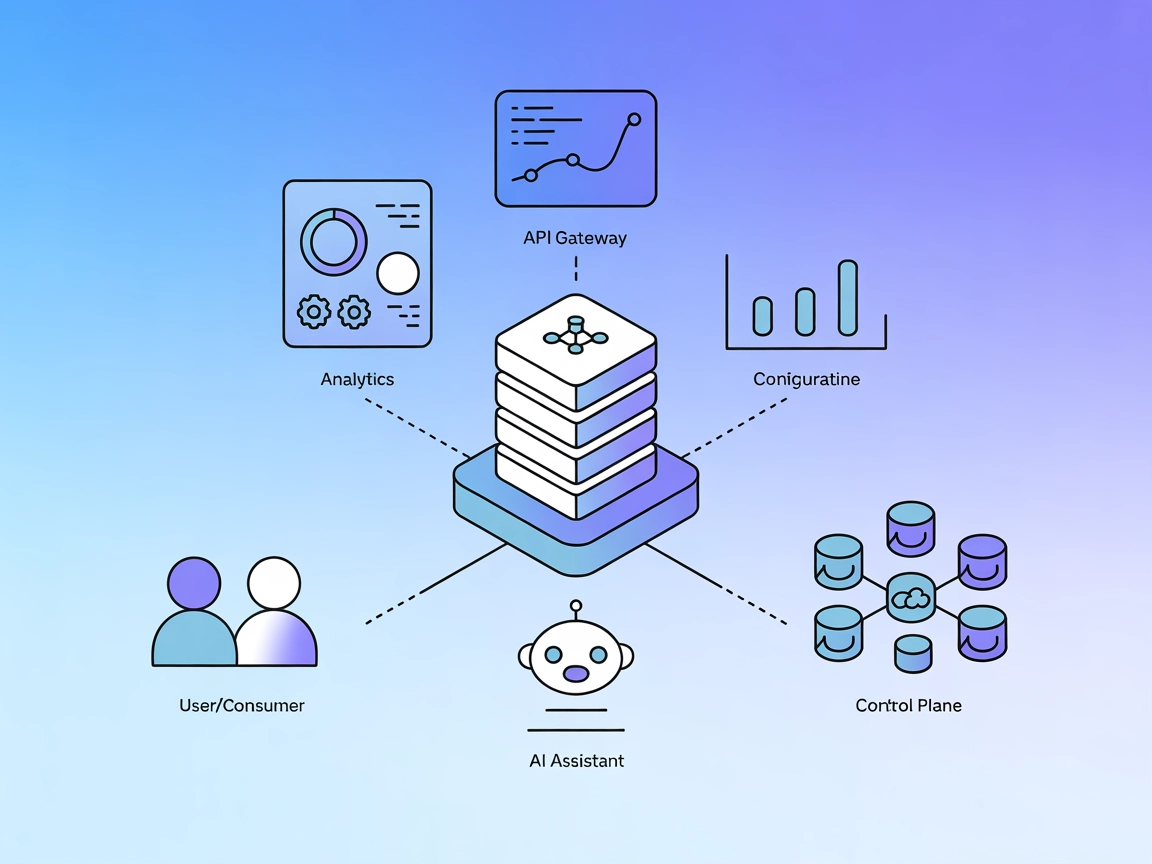
Model Context Protocol (MCP) Server
The Model Context Protocol (MCP) Server bridges AI assistants with external data sources, APIs, and services, enabling streamlined integration of complex workfl...

Connect AI agents and workflows with Consul APIs for service management, health checks, KV automation, and dynamic infrastructure orchestration.
FlowHunt provides an additional security layer between your internal systems and AI tools, giving you granular control over which tools are accessible from your MCP servers. MCP servers hosted in our infrastructure can be seamlessly integrated with FlowHunt's chatbot as well as popular AI platforms like ChatGPT, Claude, and various AI editors.
The Consul MCP (Model Context Protocol) Server is a server implementation that exposes the full suite of HashiCorp Consul’s service discovery and key-value store APIs through a standardized MCP interface. By bridging AI assistants and developer tools with Consul’s data and management capabilities, it allows AI-powered workflows to query and manage services, perform health checks, manipulate KV storage, and interact with session, event, and system data. This integration enhances development workflows by enabling tasks such as dynamic service registration, real-time health monitoring, distributed key-value management, and streamlined event handling—all accessible via AI agents and LLM-based tools. The Consul MCP Server is ideal for orchestrating, auditing, and automating infrastructure components in environments where Consul is a core part of the stack.
No specific prompt templates are mentioned or defined in the available documentation or repository files.
No explicit list of MCP resources is provided in the available documentation or repository files.
The Consul MCP Server provides tools that expose the following Consul functionalities:
No setup instructions found for Windsurf in the available documentation.
npm run build)."mcpServers":{
"mcpServers": {
"consul-mcp": {
"command": "node",
"args": [
"/ABSOLUTE/PATH/TO/PARENT/FOLDER/consul-mcp-server/build/index.js"
]
}
}
}
You can set environment variables for configuration:
{
"mcpServers": {
"consul-mcp": {
"command": "node",
"args": [
"/ABSOLUTE/PATH/TO/PARENT/FOLDER/consul-mcp-server/build/index.js"
],
"env": {
"CONSUL_HOST": "your-consul-host",
"CONSUL_PORT": "your-consul-port"
}
}
}
}
No setup instructions found for Cursor in the available documentation.
No setup instructions found for Cline in the available documentation.
Using MCP in FlowHunt
To integrate MCP servers into your FlowHunt workflow, start by adding the MCP component to your flow and connecting it to your AI agent:

Click on the MCP component to open the configuration panel. In the system MCP configuration section, insert your MCP server details using this JSON format:
{
"consul-mcp": {
"transport": "streamable_http",
"url": "https://yourmcpserver.example/pathtothemcp/url"
}
}
Once configured, the AI agent is now able to use this MCP as a tool with access to all its functions and capabilities. Remember to change "consul-mcp" to whatever the actual name of your MCP server is and replace the URL with your own MCP server URL.
| Section | Availability | Details/Notes |
|---|---|---|
| Overview | ✅ | Consul MCP Server for Consul APIs via MCP |
| List of Prompts | ⛔ | No explicit prompt templates found |
| List of Resources | ⛔ | No explicit MCP resources listed |
| List of Tools | ✅ | Service, health, KV, session, event, query, status, agent, sys |
| Securing API Keys | ✅ | Use env vars in config |
| Sampling Support (less important in evaluation) | ⛔ | Not mentioned |
The Consul MCP Server provides a robust and comprehensive interface to Consul’s core APIs, making it valuable for AI-driven infrastructure automation. However, the lack of explicit prompt templates and resource definitions somewhat limits its immediate plug-and-play usability for LLM workflows. Setup instructions are only detailed for Claude, and sampling/roots support is unclear. Overall, it is a solid, practical tool for Consul users, especially those who can define their own resources/prompts.
Rating: 6/10
| Has a LICENSE | ✅ (MIT) |
|---|---|
| Has at least one tool | ✅ |
| Number of Forks | 4 |
| Number of Stars | 10 |
The Consul MCP Server provides a standardized MCP interface for HashiCorp Consul’s APIs, enabling AI-powered tools and workflows to automate tasks like service discovery, health checks, key-value management, event handling, and more.
You can manage services, perform real-time health checks, use the key-value store, manage sessions and events, execute prepared queries, and retrieve system and agent information—all from an AI agent or workflow.
You can use environment variables in your MCP configuration to securely set Consul host and port, as shown in the example configuration.
No explicit prompt templates or MCP resource definitions are included in the available documentation. You may define your own for custom workflows.
It’s ideal for automating service registration and discovery, real-time health monitoring, AI-driven key-value automation, event-triggered infrastructure workflows, and monitoring Consul cluster leadership or sessions.
Supercharge your AI workflows by integrating Consul’s APIs for smart service discovery, health monitoring, and configuration management. Try the Consul MCP Server in FlowHunt today!

The Model Context Protocol (MCP) Server bridges AI assistants with external data sources, APIs, and services, enabling streamlined integration of complex workfl...

The Confluent MCP Server empowers AI assistants to interact with Confluent Cloud APIs, enabling natural language management of Kafka topics, connectors, and Fli...

The Kong Konnect MCP Server integrates AI assistants with Kong Konnect's API Gateway, enabling natural language queries for analytics, configuration, and contro...
Cookie Consent
We use cookies to enhance your browsing experience and analyze our traffic. See our privacy policy.